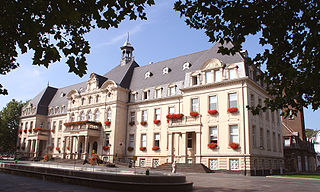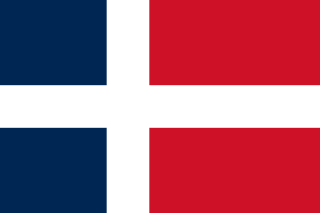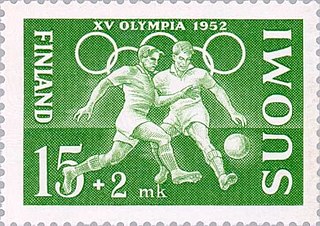
The 1952 Summer Olympics, officially known as the Games of the XV Olympiad and commonly known as Helsinki 1952, were an international multi-sport event held from 19 July to 3 August 1952 in Helsinki, Finland.

The 1952 Winter Olympics, officially known as the VI Olympic Winter Games and commonly known as Oslo 1952, was a winter multi-sport event held from 14 to 25 February 1952 in Oslo, the capital of Norway.
This is the full table of the medal table of the 1952 Summer Olympics held in Helsinki, Finland.

The Helsinki Olympic Stadium, located in the Töölö district about 2.3 kilometres (1.4 mi) from the centre of the Finnish capital Helsinki, is the largest stadium in the country, nowadays mainly used for hosting sports events and big concerts. The stadium is best known for being the centre of activities in the 1952 Summer Olympics. During those games, it hosted athletics, equestrian show jumping, and the football finals.

Dudelange is a commune with town status in southern Luxembourg. It is the fourth-most populous commune, with 19,734 inhabitants. Dudelange is situated close to the border with France.

Handball at the Summer Olympics refers to two different sports. Field handball was introduced for men at the 1936 Summer Olympics in Berlin, but dropped after that. At the 1952 Olympics, field handball was a demonstration sport. (Indoor) handball was introduced for men at the 1972 Summer Olympics in Munich. Women's handball competition was introduced at the 1976 Summer Olympics in Montreal.

The Union of Soviet Socialist Republics (USSR) first participated at the Olympic Games in 1952, and competed at the Summer and Winter Games on 18 occasions subsequently. At six of its nine appearances at the Summer Olympic Games, the Soviet team ranked first in the total number of gold medals won, second three times, and became the biggest contender to the United States' domination in the Summer Games. Similarly, the team was ranked first in the gold medal count seven times and second twice in its nine appearances at the Winter Olympic Games. The Soviet Union's success might be attributed to a heavy state investment in sports to fulfill its political objectives on an international stage.
At the 1952 Summer Olympics in Helsinki, 33 athletics events were contested, 24 for men and 9 for women. There were a total number of 963 participating athletes from 57 countries.

The National Olympic Committee (NOC) of the Saarland was founded in the spring of 1950 in the Saar Protectorate, which existed from 1947 to 1956, a region of Western Germany that was occupied in 1945 by France. As a separate team, Saar took part in its sole Olympic Games at the 1952 Summer Olympics before being allowed to rejoin the German team in 1956. Thirty-six competitors, 31 men and five women, took part in 32 events in nine sports.

Argentina participated at the Olympic Games for the first time in 1900. It has participated at all subsequent Summer Olympics except in 1904, 1912, and the nation boycotted the Moscow Olympics due to its support for the United States, in 1980. It participated at the Winter Olympics in 1928, 1948, 1952 and continuously since 1960.
Gymnastics at the 1952 Summer Olympics was represented by 15 events: 7 for women and 8 for men. All events were held between 19 and 24 July in the Messuhalli building in Helsinki. Men's events were held in Exhibition Hall I while women's events were contested in the smaller Exhibition Hall II.

The Football tournament at the 1952 Summer Olympics was won by Hungary.

Poland competed at the 1952 Summer Olympics in Helsinki, Finland. 125 competitors, 103 men and 22 women, took part in 74 events in 11 sports. Zygmunt Chychła became first post-War Olympic gold champion.

Brazil competed at the 1952 Summer Olympics in Helsinki, Finland. 97 competitors, 92 men and 5 women, took part in 51 events in 14 sports. Brazil won three medals at the 1952 Summer Olympics. Brazil won its first gold medal since its debut at the 1920 Summer Olympics. Adhemar Ferreira da Silva won the men's triple jump. Together with the bronze medal won by José Telles da Conceição in men's high jump; those were the first medals won by Brazilians at Athletics in the Olympic Games. Tetsuo Okamoto became the first Brazilian swimmer to win an Olympic medal, the bronze at the men's 1500 metre freestyle.

Israel competed in the Summer Olympic Games for the first time at the 1952 Summer Olympics in Helsinki, Finland. 25 competitors, 22 men and 3 women, took part in 17 events in 5 sports.

The Bahamas first participated at the Olympic Games in 1952, and has sent athletes to compete in every Summer Olympic Games since then, except when they participated in the American-led boycott of the 1980 Summer Olympics. The nation has never participated in any Winter Olympic Games.

West Germany competed at the Olympic Games between 1952 and 1988. While in 1952 - Germany's first Olympics after World War II and the Partitions of Germany - there was a de facto West German team, given East Germany refused to collaborate, its results are counted towards Germany. Likewise, between 1956 and 1964 both countries competed together under the United Team of Germany flag. It was not until 1968 that a full-fledged West German team appeared, and it competed in all the Olympics but the 1980 Summer Olympics - as it supported the 1980 Summer Olympics boycott - until 1988. Afterwards, the German reunification in 1990 reestablished the German team.

Athletes from Germany have taken part in most of the Olympic Games since the first modern Games in 1896. Germany has hosted three Olympic Games, in 1936 both the Winter and Summer Games, and the 1972 Summer Olympics. In addition, Germany had been selected to host the 1916 Summer Olympics as well as the 1940 Winter Olympics, both of which had to be cancelled due to World Wars. After these wars, Germans were banned from participating in 1920, 1924 and 1948. While the country was divided, each of the two German states boycotted one of the Summer Games: in 1980 West Germany was one of 66 nations which did not go to Moscow in protest at the Soviet invasion of Afghanistan and in 1984 East Germany joined the Soviet Union in the boycott of the Summer Games in Los Angeles.
For the 1952 Summer Olympics, a total of twenty-four sports venues were used. Three of the venues were constructed for the 1940 Summer Olympics, but were postponed in the wake of World War II. Those venues were completed in time for the 1952 Games. The main stadium served as host to the World Athletics Championships in 1983 and in 2005. Two venues were purchased by the city of Helsinki after the Olympics, one changed from an exhibition center to a sports arena, and another changed from a sports arena to an art museum. With an annual average temperature of 5.9 °C, Helsinki is the coldest city to host the Summer Olympics.
This article presents the national team appearances in the men's Olympic water polo tournament since the inaugural official edition in 1900.













